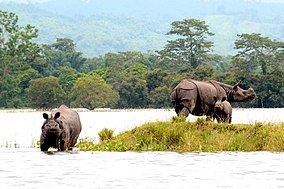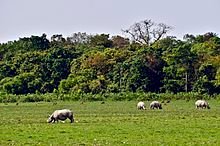 #Kaziranga #National #Park is a national park in the Golaghat and Nagaon districts of the state of Assam, India. The sanctuary, which hosts two-thirds of the world's great one-horned rhinoceroses, is a World Heritage .According to the census held in March 2018 which was jointly conducted by the Forest Department of the Government of Assam and some recognized wildlife NGOs, the #rhino(GARH in Assamese language ) population in Kaziranga National Park is 2,413.
#Kaziranga #National #Park is a national park in the Golaghat and Nagaon districts of the state of Assam, India. The sanctuary, which hosts two-thirds of the world's great one-horned rhinoceroses, is a World Heritage .According to the census held in March 2018 which was jointly conducted by the Forest Department of the Government of Assam and some recognized wildlife NGOs, the #rhino(GARH in Assamese language ) population in Kaziranga National Park is 2,413.
It comprises 1,641 adult rhinos (642 males, 793 females, 206 unsexed); 387 sub-adults (116 males, 149 females, 122 unsexed); and 385 calves.[3] In 2015, the rhino population stood at 2401

Kaziranga is home to the highest density of tigers among protected areas in the world, and was declared a Tiger Reserve in 2006 (now the highest tiger density is in Orang National Park, Assam) . The park is home to large breeding populations of elephants, wild water buffalo, and swamp deer.[4] Kaziranga is recognized as an Important #Bird Area by BirdLife International for conservation of avifaunal species. When compared with other protected areas in India, Kaziranga has achieved notable success in wildlife conservation. Located on the edge of the Eastern Himalaya biodiversity# hotspot, the park combines high species #diversity and visibility.
